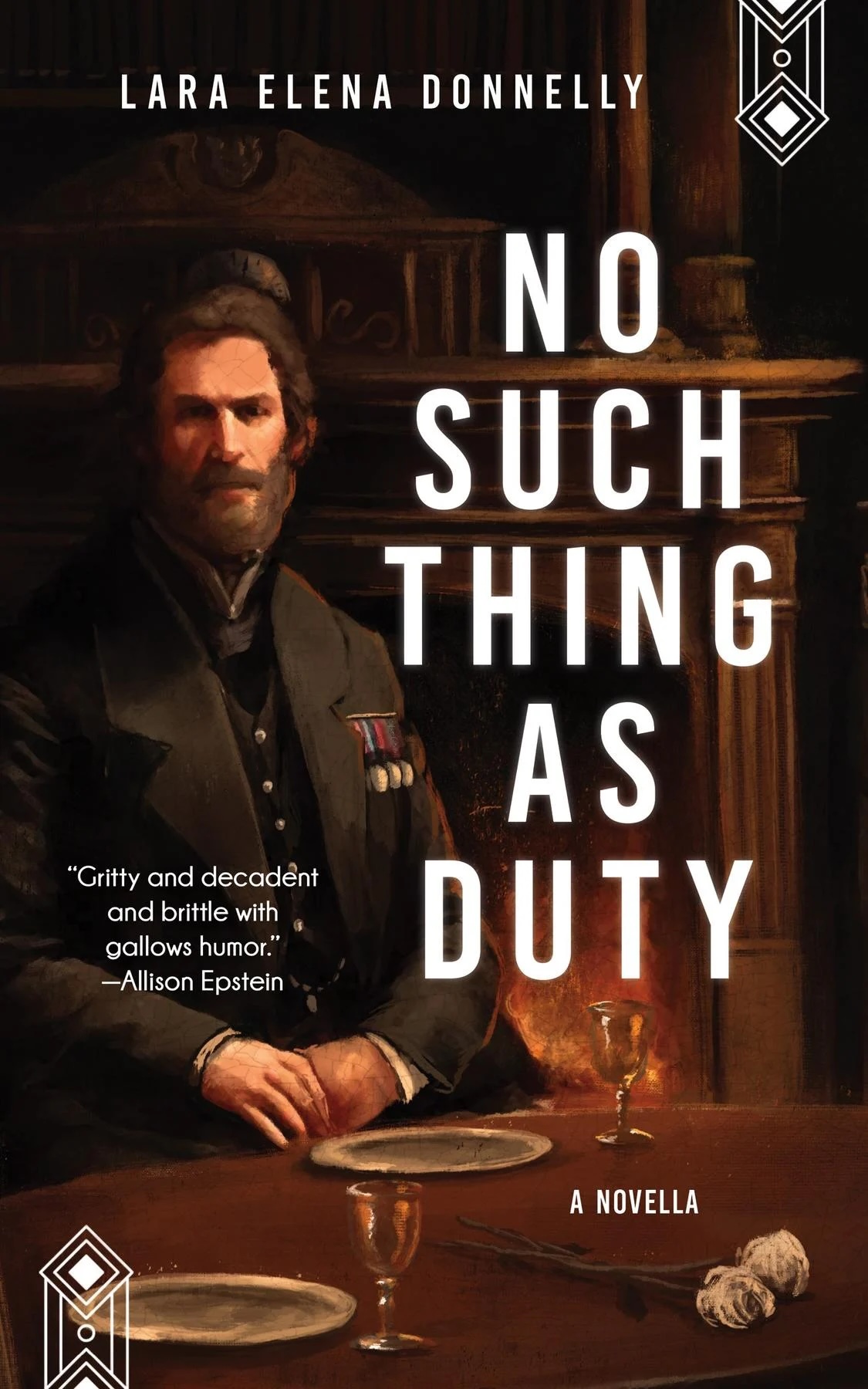
Lara Elena Donnelly is joining us today to talk about her novel, No Such Thing as Duty. Here’s the publisher’s description:
In the waning days of World War One, William Somerset Maugham–novelist, playwright, and spy–is sent to Romania to serve allied interests in the fight against Austro-Hungary, while dying of tuberculosis. His handler sets him to recruit mysterious Carpathian nobleman Walter Roşu to the cause. But Roşu is more interested in William than the war, and William struggles to fulfill his duty in the face of death and desire.
What’s Lara’s favorite bit?

No Such Thing as Duty, which came out on April 8th, is a novella about the novelist, playwright, bisexual, and spy W. Somerset Maugham: an alternate history in which he is sent to Romania in the waning days of World War I, ostensibly to inveigle the Don Cossacks into further cooperation with the allies. But Romania has just signed an armistice with the Germans and a treaty looks likely. He’s too late to do his job. And he’s dying of tuberculosis.
World War I: pretty notorious for being cold, bloody, muddy, and grueling. Tuberculosis: famously unpleasant, often fatal. Add a dash of “alone in a foreign country” and “bitterly cold winter” plus “marriage on the rocks,” “writers block,” and “lack of fulfilling projects in your day job,” and it all sounds pretty miserable, right?
And yet: My favorite thing about this novella is its coziness. One of my early readers said “it’s crazy that you managed to take this story about a guy dying of tuberculosis in the middle of the war to end all wars and make it so cozy and pleasant!” But indeed. There’s hot cocoa and cake in bed. Steamy cafes serving rustic dumplings. Viennese coffee houses! Cognac in front of roaring fires! Bearskin rugs! Mink coverlets! Maybe it’s the juxtaposition with the grimness of war and wintertime that makes the small pleasures feel so luscious.
In literature, tuberculosis is a romantic illness famous for fits of swooning, for the dramatic coughing of blood into a lace handkerchief. When its symptoms recede, sufferers are often full of hectic energy, lust, flights of fancy. And that’s the dichotomy of the book, too. Even within a paragraph, within a sentence, the story bounces back and forth between wartime deprivation and opulent luxury, between explosive passion and crushing grief. The pleasures of the flesh in stark contrast to the shadow of death lingering over the characters, the city, the world.
“The cocoa smells incredible. It pours thickly, made with the heavy cream cafés can no longer find.”
“…pork cooked a little rare for William’s taste, and a crime in a country where meat has become illegal, on a continent where war-time deprivation is the norm…”
“The kiss tastes salty, ferric. The sticky slip of blood is between their lips, turning tacky where it dries.”
Oh yeah, speaking of the pleasures of the flesh, it’s quite a sexy little book as well.
Part of this is just my own preferences, interests, and foibles as a writer: I like to write about what I like, and I like cozy luxuries. Who doesn’t! Who wouldn’t want to indulge their imagination by writing about the feel of a mink coverlet smoothed under their palm? About eating freshly-fried donuts and strong coffee in a steamy café while someone plays a piano that’s charmingly out of tune? Firelit libraries and long conversations about art and literature. Quilted dressing gowns. Gramophones. The golden stretch of a woman’s naked thigh, her bare toes curled in the carpet. Fresh bread and cured sausage and hard cheese, a bottle of red wine. It’s the most indulgent game of pretend I know.
When it’s interspersed with the grim realities of history, all that sumptuousness, all that indulgence, every little treat—it all takes on an extra poignancy. For me as a writer, including the pleasure felt very much like carving out some solace and comfort for these long-suffering characters. And it really lets your prose pack a punch; the contrasts make each piece of imagery hit harder. The coziness is cozier; the horror that much more horrible. The threat of annihilation does tend to make you appreciate the little luxuries all the more.
LINKS:
laradonnelly.com | newsletter | goodreads
BIO:
Lara Elena Donnelly is the Nebula, Lambda, and Locus-nominated author of The Amberlough Dossier. Her work has appeared in Strange Horizons, Escape Pod, Nightmare, and Uncanny.
Lara is a graduate of the Clarion and Alpha workshops, and has taught at Sarah Lawrence College and the Catapult Workshop in New York.
